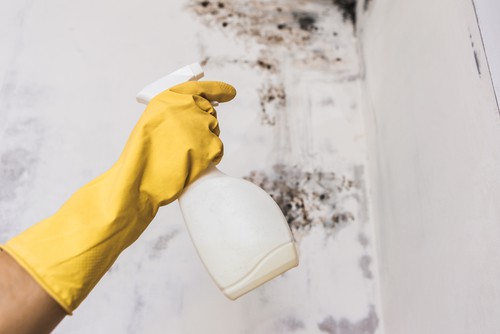
Can Aircon Help To Prevent Mold and Mildew Growth? Air conditioning systems play a crucial role in maintaining a comfortable indoor climate.
However, they also have a significant impact on the levels of mold and mildew in your home.
Mold and mildew, which thrive in damp environments, can pose serious health risks and damage your property.
The presence of mold and mildew in homes can lead to various health issues, especially for those with allergies or respiratory problems.
Keeping these fungi at bay is vital for a healthy living environment.
Understanding Mold and Mildew in the Home
Mold and mildew are types of fungi that grow in moist environments.
Mold is typically black, green, or red and can infiltrate deep into surfaces, whereas mildew is often white or gray and remains on the surface.
Common Causes and Locations for Mold and Mildew in Homes
Mold and mildew are commonly found in damp areas such as bathrooms, kitchens, basements, and anywhere with poor ventilation or water leakage.
Humid conditions, lack of sunlight, and warm temperatures also contribute to their growth.
Role of Air Conditioning in Controlling Mold and Mildew
How Aircon Can Help Prevent Mold and Mildew Growth
Air conditioners can help control mold and mildew by reducing indoor humidity and maintaining a consistent temperature. Dry, cool air is less hospitable to mold and mildew.
The Importance of Humidity Control
Controlling humidity is essential in preventing mold and mildew.
Air conditioners with dehumidification features can effectively maintain humidity at levels that discourage mold growth (ideally between 30% and 50%).
Optimal Aircon Settings for Mold Prevention
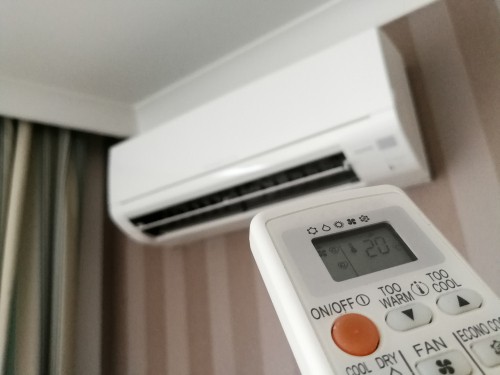
The ideal temperature for preventing mold and mildew growth is 20-22°C (68-72°F). Keeping humidity levels below 60% is also crucial.
Seasonal changes can affect indoor humidity levels. In humid seasons, lowering the temperature or using a dehumidifier in conjunction with your aircon may be necessary.
Regular Aircon Maintenance to Combat Mold
Essential Maintenance Tips to Prevent Mold
Regular maintenance can prevent mold growth, including cleaning the air filters, checking for drainage blockages, and ensuring the aircon system is free of dust and debris.
Cleaning and Replacing Aircon Filters
Dirty or clogged air filters can restrict airflow and lead to higher humidity levels, providing an ideal environment for mold. Regularly cleaning or replacing these filters is a key step in mold prevention.
Ventilation Strategies Alongside Air Conditioning
While air conditioning can control temperature and humidity, adequate ventilation prevents mold. This involves allowing fresh air to circulate throughout the home.
Natural ventilation, such as opening windows when the weather allows, can help reduce indoor humidity levels and prevent mold growth.
Additional Ways to Reduce Humidity and Mold Risk
Using Dehumidifiers in High Humidity Areas
In areas with high humidity, such as basements, using a dehumidifier can significantly help reduce the risk of mold and mildew.
Simple Lifestyle Changes to Reduce Indoor Humidity
Simple changes like using exhaust fans in bathrooms and kitchens, drying clothes outside, and fixing leaks promptly can significantly reduce indoor humidity and mold risk.
Identifying and Addressing Mold and Mildew Issues
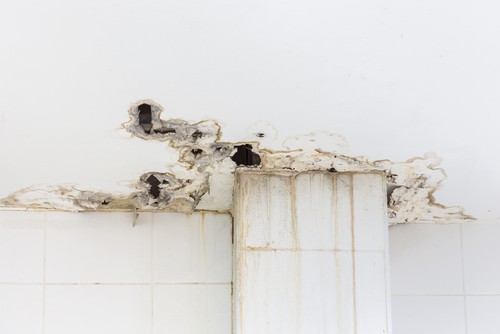
Early signs of mold and mildew include a musty smell, visible growth on walls, ceilings, or other surfaces, and increased allergy symptoms among household members.
If you find mold in your home, it’s essential to clean it promptly and address the source of moisture. For large infestations, consider hiring a professional mold remediation service.
Health Risks Associated with Mold and Mildew
Mold exposure can cause various health issues, including respiratory problems, allergic reactions, and, in severe cases, neurological symptoms.
Individuals with asthma, allergies, or compromised immune systems are particularly susceptible to the effects of mold. Maintaining a mold-free environment is crucial for their health and well-being.
Cleaning and Remediation of Mold and Mildew
For small areas of mold, a solution of detergent and water can be used for cleaning. It’s essential to wear gloves and a mask to avoid inhaling spores.
For extensive mold problems or if the mold is in hard-to-reach areas, it’s advisable to call professional services. They have the necessary tools and expertise to remove mold safely.
Preventive Measures Beyond Air Conditioning
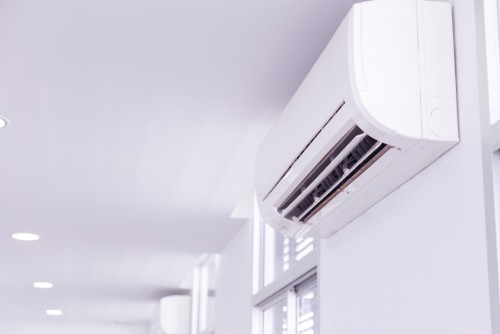
Choosing mold-resistant materials and ensuring proper insulation can help prevent mold growth. Proper design that includes good airflow and sunlight exposure is also essential.
Certain indoor plants can absorb excess moisture and improve air quality. However, avoiding overwatering them is essential, which can contribute to higher humidity levels.
Frequently Asked Questions
Can an air conditioner completely prevent mold and mildew?
While an air conditioner can significantly reduce the risk of mold and mildew by controlling humidity, it cannot completely eliminate the risk, especially in areas prone to moisture.
What are the first signs of mold I should look for?
Early signs of mold include a musty smell, visible growth on surfaces, and increased allergic reactions or respiratory issues among residents.
How often should I clean my aircon to prevent mold?
It’s recommended to clean and service your aircon at least twice a year to prevent mold growth and ensure it’s functioning efficiently.
Are there any health signs indicating a mold problem in my home?
Health signs of a mold problem can include persistent coughing, sneezing, itchy eyes, or worsening asthma symptoms.
Can Aircon Help To Prevent Mold and Mildew Growth? – Conclusion
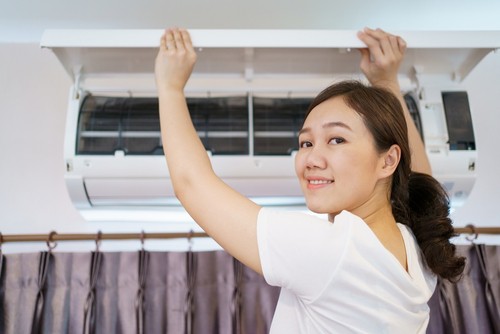
Using air conditioning effectively for mold prevention involves maintaining optimal temperature and humidity levels, regular maintenance of the aircon unit, and incorporating additional strategies like adequate ventilation and dehumidifiers.
A comprehensive approach to preventing mold in your home includes relying on air conditioning and adopting a lifestyle that reduces humidity, using mold-resistant materials in home construction, and remaining vigilant to the early signs of mold growth.
This holistic approach ensures a healthier, more comfortable living environment.
Are you seeking a professional and reliable aircon servicing company in Singapore? Contact us today!
